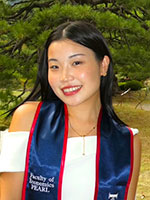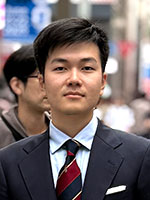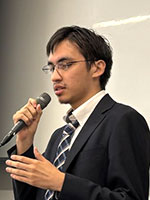
Students Interview 2025

NAME: Eru Ishikawa
YEAR: PEARL 4th
RESEARCH TOPIC: “Shifting Priorities in Bilateral Aid? Evidence from Top Donor Behavior Between the 1990s and 2010s.”
“Researching the Complexities of Foreign Aid”
1. Why did you choose to take part in the Independent Research Project?
During my year abroad at the University of California, San Diego, I took a developmental economics class with Professor Sara Lowes, where we examined how modern aid can sometimes harm recipients due to existing power imbalances. This paradox sparked my interest in studying aid in its contemporary context, particularly given ongoing global conflicts. The IRP offered the ideal opportunity to explore this topic in depth and align it with my academic interests. I was fortunate to receive approval from Professor Hiroyuki Yamada, whose work I have long admired, and under his guidance, I developed a project that reflects both my curiosity and long-term goals.
2. What was the most rewarding experience?
Although I was deeply intrigued by my topic, I never imagined I could research it at the undergraduate level, given its complexity and the ongoing debates surrounding aid cuts and political turmoil. Bilateral aid allocation involves a wide range of factors and actors, making it a challenging but rewarding subject. The most fulfilling part of the project was the ability to connect my findings to broader political and economic contexts. Completing the paper gave me a glimpse into the depth of research required to follow such a dynamic field, and it strengthened my motivation to continue engaging with global policy debates.
3. How do you apply what you have learned here to the future?
As I prepare to graduate from Keio, I will be working as a financial journalist, a role that brings together my passion for economics and finance with my love for writing. Much like academic research, journalism requires gathering information, analyzing facts, and presenting them clearly to an audience. Through the IRP, I developed the ability to think critically about global issues and approach complex problems objectively. In my reporting, I hope to draw on these skills and my familiarity with social and economic affairs to deliver accurate, thoughtful coverage of events that shape the modern world.
4. A short message to future participants
If you have even a remote interest in a topic and the motivation to explore it beyond classroom assignments, I strongly recommend taking part in this project. You don’t need to have a perfectly defined research question from the start, but what matters most is beginning with a broad area of curiosity and working with a supportive supervisor who can guide you along the way. The IRP is a unique opportunity to pursue ideas you deeply care about.
(Interviewed: September, 2025)

NAME: Manabu Ogata
YEAR: PEARL 3rd
RESEARCH TOPIC: “From the Nixon Doctrine to Contemporary U.S. Foreign Policy: A Study of U.S. Declinism and Persistence of U.S. Primacy”
“Reevaluating the Narrative of U.S. Decline”
1. Why did you choose to take part in the Independent Research Project?
I chose to take part in the Independent Research Project for two reasons. First, I wanted to explore in greater depth a subject that I was passionate about. The opportunity to receive one-on-one guidance from a professor at the undergraduate stage is rare, and I was very attracted to this chance. Second, I had greatly enjoyed my supervisor’s lecture at Hiyoshi and believed that her supervision would allow me to move beyond coursework, challenge myself, and develop ideas into a structured project. I saw the IRP as a unique opportunity to grow both academically and personally, while also producing work that reflects my interests.
2. What was the most rewarding experience?
The most rewarding experience, as many would probably say, was seeing the entire research come together. Since my project relied heavily on extensive reading and qualitative analysis rather than purely quantitative methods, looking back and connecting notes from months prior proved to be a real challenge. Nevertheless, after months of reading, gathering data, and engaging in discussions, my research and thesis began to take shape. Ultimately, the paper bridged two areas I deeply care about: the foreign policies of the past and present. Just as important, the true process of receiving feedback from my supervisor forced me to clarify my thinking and strengthen my arguments. Watching all the different threads merge into a single coherent narrative was not only rewarding, but also one of the most valuable lessons from my time at Keio.
3. How do you apply what you have learned here to the future?
My experience has taught me both academic and personal skills that I hope to carry into graduate research and beyond. Academically, I learned to frame a research question that captures a gap in academic research, albeit under the feasibility constraints of undergraduate research, evaluate academic sources critically, and integrate garnered evidence and analysis into a coherent paper. On the personal side, I was able to strengthen my time management skills, resilience, and ability to persevere independently on a project for a long period. In my future graduate studies, I will apply these skills where managing long-term projects and sustaining rigorous research is required. In my professional career, the lessons will prove to be valuable as I aspire to work in a role that requires critical thinking and a global perspective. Most importantly, the Independent Research Project equipped me with confidence to voice my arguments and the ability to take initiative in a project.
4. A short message to future participants
To all future IRP participants, I encourage you to see this as a rare chance to explore what truly interests you. While deadlines and time management can feel demanding, the coordinators and supervisors genuinely want you to enjoy the process and make it your own. The IRP is one of the few times in your undergraduate years where you can grow through independent research. What you gain will depend on the effort you invest, so take full advantage of this opportunity and pursue what you love.
(Interviewed: September, 2025)

NAME: Mori Kenshiro
YEAR: PEARL 3rd
RESEARCH TOPIC: “Colonial Education and the Printing Press: How Education and Media Boundaries Illustrated Divisions Within Algerian Nationalism in the 1930s”
“Colonial Education, Print Media, and the Shaping of Algerian Nationalism in the 1930s”
1. Why did you choose to take part in the Independent Research Project?
I chose to take part in the Independent Research Project because it offered the freedom to pursue a subject that connects history, politics, and media studies—fields that fascinate me beyond the standard curriculum. My coursework in economics and area studies introduced me to questions about how institutions shape societies, but I wanted the chance to investigate these dynamics independently. The project provided an opportunity to test whether I could identify an original angle, develop it into a coherent research question, and engage with sources in multiple languages. By examining colonial Algeria, I was able to bring together my training in economics, history, and French studies, while contributing to an underexplored area in post-colonial research. This freedom to integrate disciplines and test my own academic voice was the main reason I chose the project.
2. What was the most rewarding experience?
The most rewarding experience was working directly with original historical documents, such as scanned newspapers from the 1930s preserved in the French National Library. Reading these texts in their original language—sometimes uncensored, sometimes censored—allowed me to see how competing nationalists in Algeria articulated identity and legitimacy through the medium of print. It was eye-opening to compare these primary sources with the interpretations of scholars like McDougall or Courreye, and to discover both overlaps and gaps. This process taught me not only how to analyze texts critically but also how to respect the complexity of voices in history, rather than reducing them to simple narratives. It was also rewarding to share my findings at symposia in Japan, where I could discuss ideas with specialists in Maghreb studies and refine my arguments in dialogue with others.
3. How do you apply what you have learned here to the future?
This project sharpened my ability to think across disciplines, languages, and methods, which I intend to apply in both academic and professional contexts. The research process showed me the importance of situating contemporary issues—such as debates on immigration or multiculturalism in Europe—within their deeper historical and institutional roots. By understanding how education and media shaped Algerian identity under colonialism, I now approach present-day socio-political issues with greater nuance and historical sensitivity. Practically, I learned to use digital tools such as OCR to handle large corpora of primary sources, a skill that will be useful in any data-driven field. More broadly, the experience reinforced my interest in pursuing further research in political economy, post-colonial studies, and media history, potentially at the graduate level, while also informing how I approach global challenges in policy or international organizations.
4. A short message to future participants
The Independent Research Project is a rare opportunity to move beyond coursework and discover how you think as a researcher. My advice is to choose a topic that genuinely excites you, even if it feels ambitious or unconventional. The process will be challenging—navigating sources, finding your argument, and revising drafts—but the independence you gain and the skills you develop are invaluable. Don’t be afraid to engage with experts and peers; their feedback will sharpen your work. Most importantly, enjoy the journey of building something that is truly your own.
(Interviewed: September, 2025)




